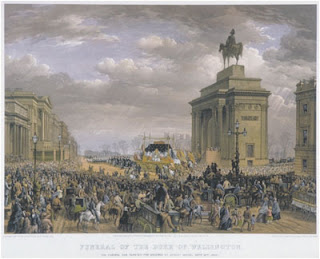Good morning/afternoon everyone. I’m recycling a blog post from October 25, 2007 today, the anniversary of two major battles, neither of which have anything to do with the Regency period.

In 1415, Henry V won the Battle of Agincourt, one of the attempts by England to get a foothold in France (and am I the only person who prefers the Olivier version over the Branagh film?).

And in 1854, thanks to bungled orders, political infighting among officers, and the famed stiff upper lip, the Charge of the Light Brigade took place, when the 13th Hussars charged directly into enemy guns during the Crimean War. As a French general commented, “C’est magnifique mais ce ne pas la guerre.” (Roughly translated as: it’s magnificent, but not war. Well, it sounds better in French.)
 I’d hazard a guess that we remember these events by the two poets who immortalized them rather by the history. Here’s an excerpt from the famous St. Crispin’s Day speech by Shakespeare:
I’d hazard a guess that we remember these events by the two poets who immortalized them rather by the history. Here’s an excerpt from the famous St. Crispin’s Day speech by Shakespeare:
We few, we happy few, we band of brothers;
For he to-day that sheds his blood with me
Shall be my brother; be he ne’er so vile,
This day shall gentle his condition;
And gentlemen in England now-a-bed
Shall think themselves accurs’d they were not here,
And hold their manhoods cheap whiles any speaks
That fought with us upon Saint Crispin’s day.
Tennyson, another master of the soundbite, immortalized the Charge of the Light Brigade, a peom that, if you are an English person of a certain age, you had drummed into you at school, or at least the more quotable bits of it:
Their’s not to make reply,
Their’s not to reason why,
Their’s but to do and die:
Into the valley of Death
Rode the six hundred.
I wonder if we would remember these two events–the English tried for a couple more centuries to claim bits of France, but failed; and the famous Charge was a tactical blunder of monumental stupidity–if it weren’t for the poets.
And a reminder that the contest to win one of my books about Jane Austen as a vampire is still open at Dark Jane Austen. Now I must go and write. What are you up to today?


